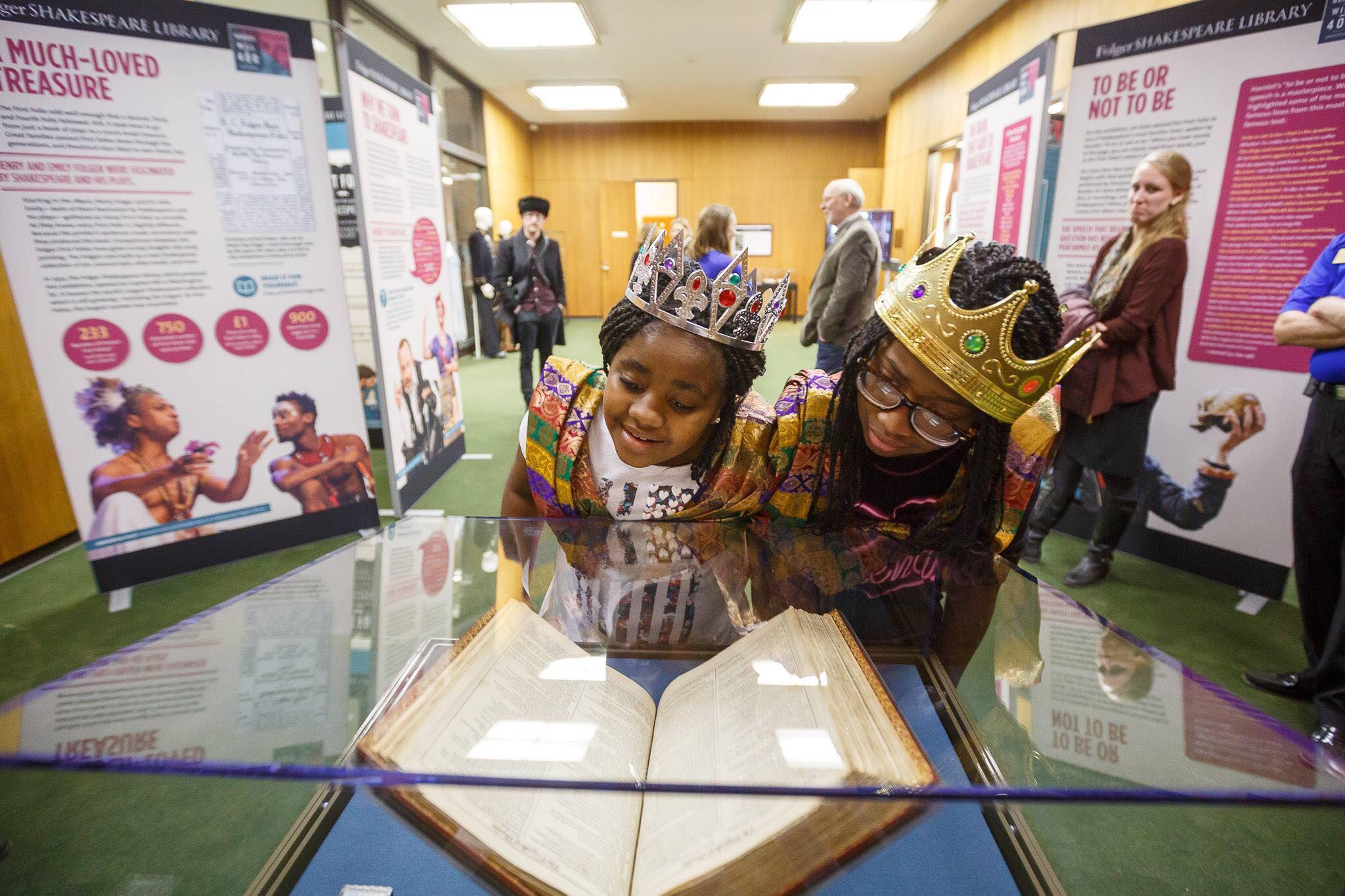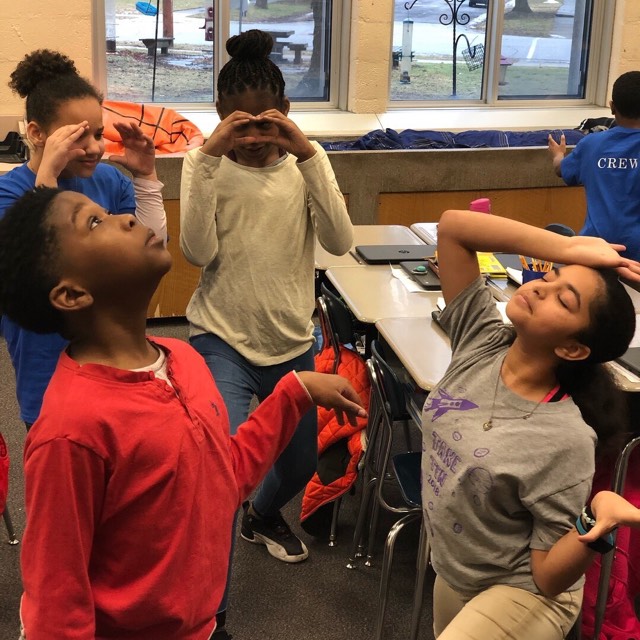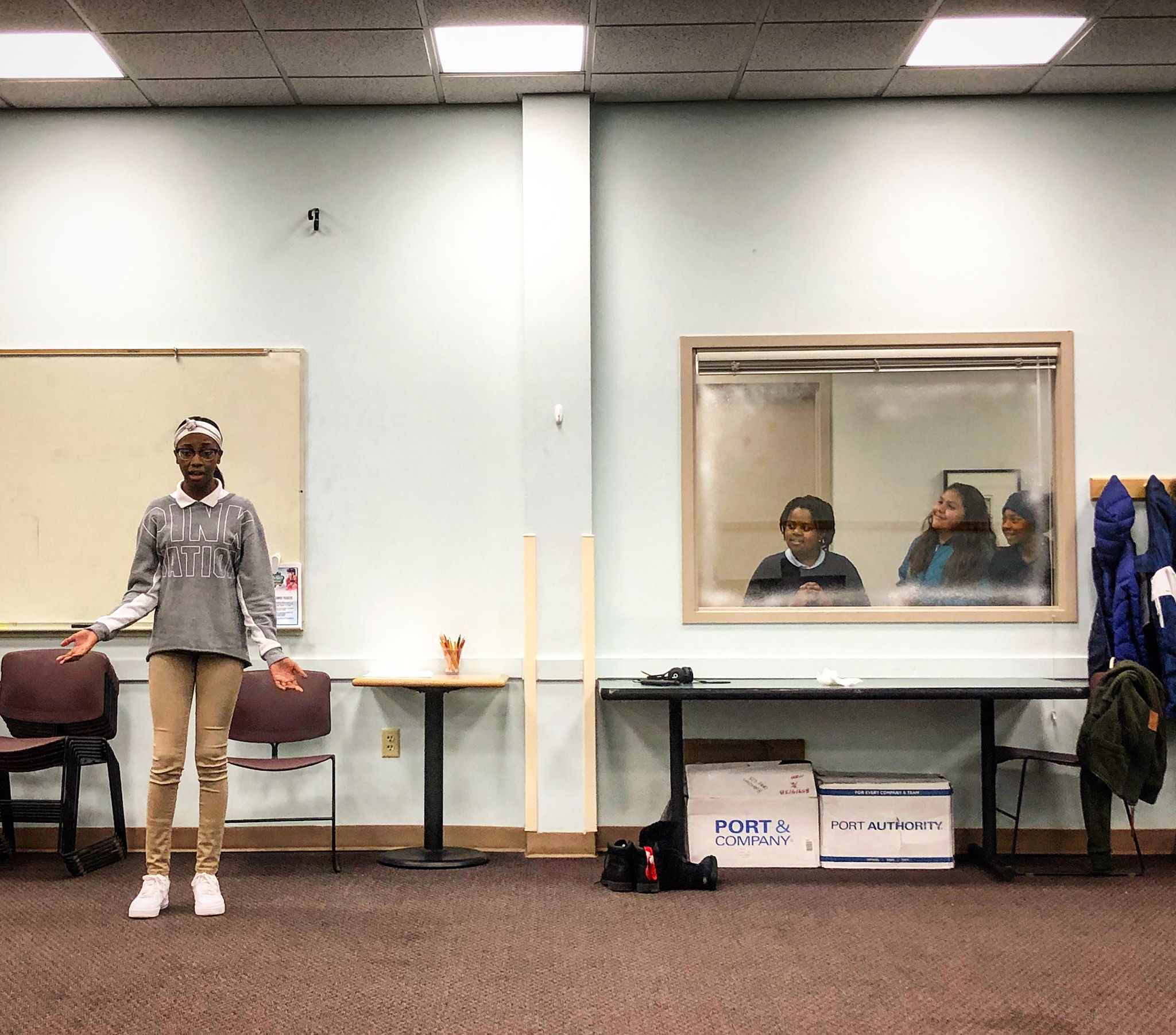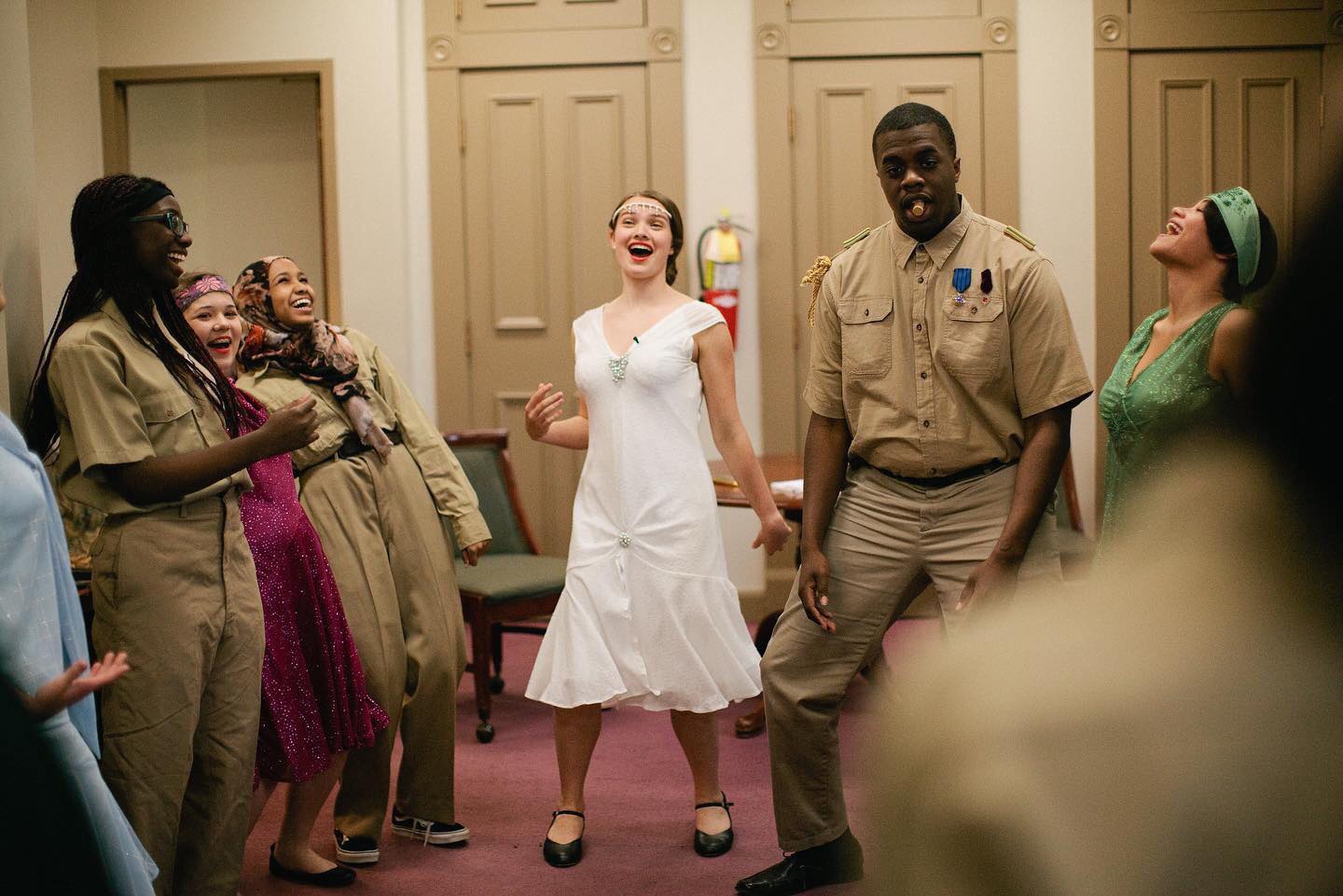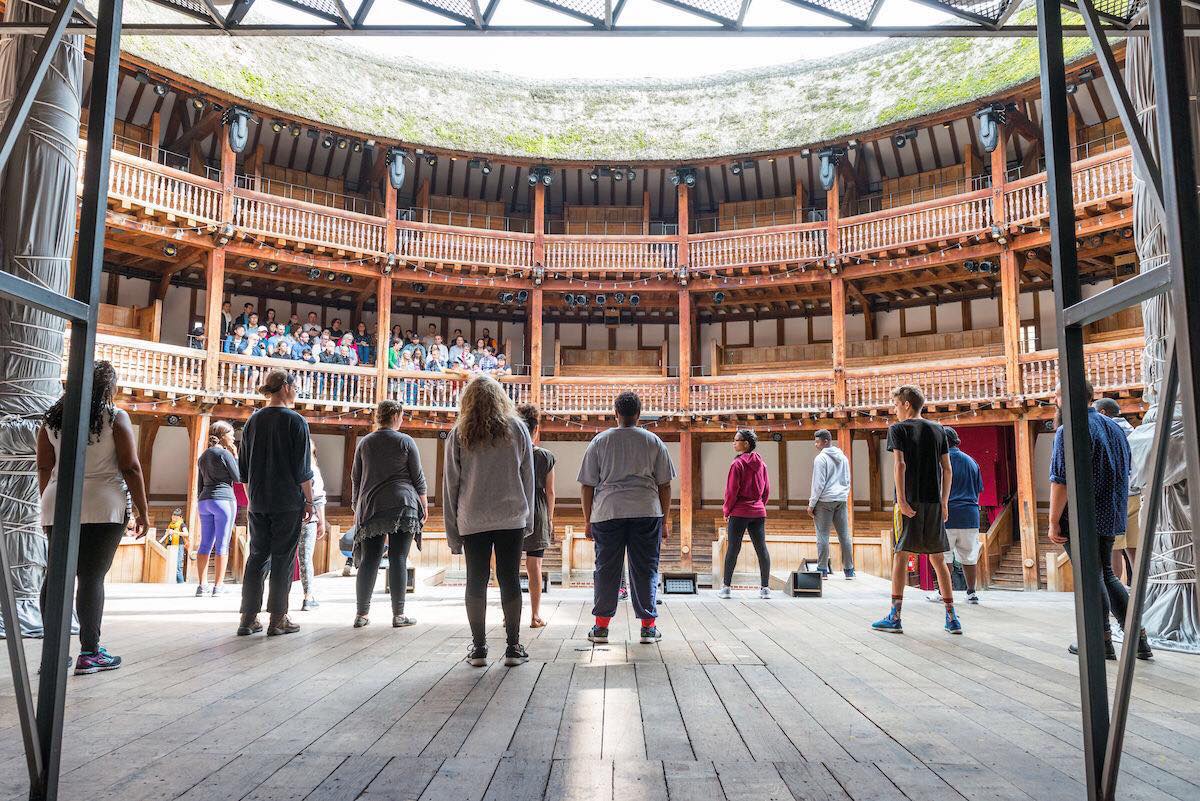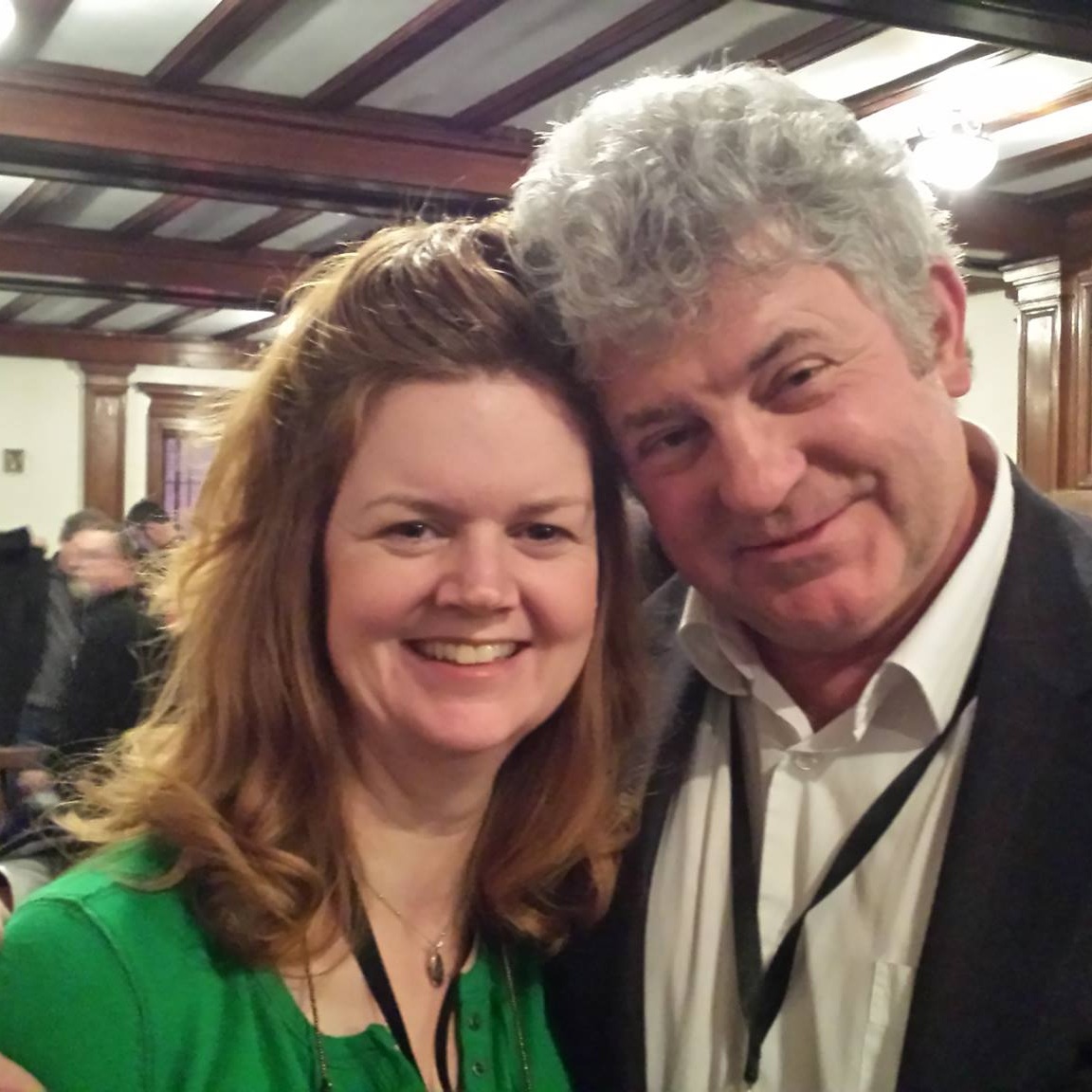It’s the final week of Q&A August! Let me take you back to 2016, to my first ever Shakespeare Theatre Association conference, hosted by Notre Dame University in South Bend, Indiana. It was the last day, and the morning’s warm-up session was being conducted by Christy Burgess and the Robinson Shakespeare Company, a community Shakespeare program for school-aged kids. After several rounds of fun theatre games, Christy asked her students if any of them wanted to perform some Shakespeare for this objectively intimidating roomful of seasoned, experienced, and elite Shakespeare practitioners and educators.
Every single hand flew up into the air.
After some negotiation, a tiny girl in a pink dress, probably not more than nine or ten years old, stood up. Awww, this is so cute. Is she going to do Puck’s “If we shadows have offended” epil— NOPE. She narrowed her eyes and spat out Cloten’s “meanest garment” speech from Cymbeline with all the vitriol of a rejected privileged white man. My jaw literally dropped. HOW was this possible?
The answer was Christy Burgess. I’d actually met Christy the year before, when I drove down to South Bend to see a couple shows at the Notre Dame Shakespeare Festival, and she immediately overwhelmed me (in a good way) with her energy, enthusiasm, and passion not just for teaching kids Shakespeare, but for giving them ownership of Shakespeare. Every single one of her students believes that Shakespeare is theirs. I’ll never forget Christy telling me what her students’ reaction was upon meeting a professional Shakespeare company: “Oh, you do Shakespeare too? That’s cute... WE do Shakespeare.”
On a more personal level, Christy helped shepherd me through the impostor syndrome I suffered from while attending my first conference, giving me the confidence to find my place in the Shakespeare community without constantly apologizing for being “just someone who draws stupid stick figures”. Christy builds people up, and the world is better for it.
1. Who are you? Why Shakespeare?
My name is Christy Burgess and I am the director of the Robinson Shakespeare Company. I am a teacher, director, and have most recently been christened “Shakespeare Maven” by my friend Julia.
Why Shakespeare? There are so many reasons for “why Shakespeare”. The Robinson Shakespeare Company starts in 3rd grade and the first day of our 3rd-6th grade class is one of my favorite all year. Many of our young actors have waited since kindergarten watching their older siblings or young adults they admire go through the program. The anticipation and excitement on that first day of class is palpable, because they finally get to do Shakespeare. It’s also become something that is a little subversive. There are times when our kids are told “you don’t really like Shakespeare” or “shouldn’t you be playing sports?”, which has the effect of “don’t tell me what I’m supposed to like!”
In a meeting, someone asked one of my students “Why Shakespeare?” She told a story I hadn’t heard before. It was right after her father passed, before she went back to school. She was walking around the track at her high school and passed an elderly white couple. The woman said to her “shouldn’t you be in school?” to which her husband responded “Mary, don’t you know that’s how people get shot?”
This young woman said “when people walk by me, they might think I’m a hood or a thug, but Shakespeare is mine, something no one can take away from me.”
When we study plays from Eugene O’Neil or Arthur Miller, it’s the world through their eyes, but when we play Shakespeare, it’s the world through OUR eyes.
2. What moment(s) in Shakespeare always make you laugh?
Scene 3.4 in Twelfth Night always cracks me up! There’s something about the most non-threatening duel letter from Sir Andrew to Cesario/Olivia and the forced fight that is always funny.
Mya interjects: “Is’t so saucy?” is one of my favorite lines in Shakespeare. It’s such a stupid joke. I don’t care. I love it.
3. What's a favorite Shakespearean performance anecdote?
Every now and then there’s Shakespeare magic.
When I was teaching and directing in Alaska with the Fairbanks Shakespeare Theatre, I had made a comment to my young actors about performing in the rain. I’m pretty sure they prayed for rain, because our last performance of The Merry Wives of Windsor, it POURED. The audience ran for cover, but nothing could erase the looks of glee on the actor’s faces. Falstaff’s line, “let the sky rain potatoes”, pretty much said it all!
In 2017, the Robinson Shakespeare Company (RSC*) was invited, and traveled, to England to perform in Stratford-upon-Avon the Shakespeare Birthplace Trust’s Shakespeare Garden. The New Place recently opened and we discovered that we were the first group to perform there….if the weather held out. There were numerous sunshine dances (involving jazz hands), prayers, and wishes. The day of the performance, there was a storm coming right for us. It was the closest thing to magic I’ve seen. It was as if the storm was around us. In videos, you can see the wind whipping the costume and the slightest drizzle of rain, but we made it!
*I know, I know, the Royal Shakespeare Company, Reduced Shakespeare Company, etc. I like to think of us as the Royal Shakespeare Company’s distant (many times removed), scrappy cousins that will be revealed if we do a deep dive on our genealogy chart.
This memory might be tinged with jet lag, because during the same trip I sat in-between two 12 year olds, who only fell asleep 30 minutes before landing. When we arrived in Stratford, we were met by the incredible Cait Fannin-Peel (my Shakespeare wife and hero). Our bed and breakfasts weren’t ready yet, so she took us on a tour of Shakespeare’s Birthplace. They have an amazing little stage in-between the house and the giftshop where actors were performing bits of Shakespeare. Cait asked if we would like to perform something. Jet lagged, sleep deprived, and thrilled, it took about 30 seconds to plan out the opening to Cymbeline and start performing it. Tourists surrounded us with their cameras and applauded when the scene was done. It felt amazing as a director of young people to see them confident on stage in a setting that was incredibly different from what they were used to. We have video evidence!
4. What's one of the more unusual Shakespearean interpretations you've either seen or would like to see?
Bart Sher’s Cymbeline at Intiman changed me. The set was simple; a red raked stage, but by being so, it didn’t need massive set changes, we were with the story the entire time. The production was funny, moving, and stunning.
I’m frustrated by Shakespeare that tries to distract you from thinking it is Shakespeare. I’ve been in, or seen productions, where it’s like “look at these live animals” or “explosions” or “a fake ice rink that isn’t integral to the plot and is really slick in the rain, but look, people are ice skating for 30 seconds” that are unnecessary. I believe you should be able to wear black clothes on a blank stage and get the story across; everything else is just icing. If not, it’s not good Shakespeare.
Mya interjects: I am broadly in agreement with Christy here, except that I desperately want MORE live animals on stage. Dogs. Goats. Rabbits. Gerbils. I don’t care if they’re not textually supported.
5. What's one of your favorite Shakespearean "hidden gems"?
I don’t know if it’s a hidden gem, but I love Henry IV, Part 1 and 2. I think it’s such a loss when they’re combined, because they are both stellar plays for different reasons. Yes, Henry IV, Part 1 has all the action, but Henry IV, Part 2 has phenomenal speeches and you get to see just how devious Falstaff is. Food for powder, anyone?
6. What passages from Shakespeare have stayed with you?
This quote from Romeo and Juliet is how I feel about teaching. During the school week, I am in 24 classes in the South Bend community, mostly in Title 1 schools. Last year, Tuesdays were long days. I would teach six classes at a middle school, plus an after-school program, then direct the RSC. That was approximately 190 kids and the day lasted from 9 am-9 pm. It wasn’t, however, so bad, because I work with really great kids. I feel what I give to them, they give back and the days don’t feel long.
“the more I give to thee,
The more I have, for both are infinite.”Juliet, Romeo and Juliet, 2.2
Also “bless you fair shrew” which I say to my dog all the time when she sneezes.
Mya interjects: BLESS YOU FAIR SHREW THAT’S THE BEST I LOVE IT
7. What Shakespeare plays have changed for you?
The first time I saw Franco Zeffirelli’s Romeo and Juliet, I was twelve and locked myself in the bathroom and cried. Seriously though, who didn’t? Do you have a heart of stone???
Mya interjects: Yes. :P
During our 2017 trip, we took our RSC to see the REAL RSC’s Titus Andronicus. Blanche McIntyre is a badass director. It’s easy to dismiss, Titus, but she found depth, and urgency. The show made our company better.
My actors still refer to the performance when we talk about high stakes and urgency.
8. What Shakespearean character or characters do you identify the most with?
I love Viola. She goes on such a journey and her “make me a willow cabin at your gate” speech moves me every time. We don’t get to pick who we love. I’m really lucky that I have a sweetheart who loves me, Shakespeare nerdiness and all.
If I could be a character? Henry V.
9. Where can we find out more about you? Are there any projects/events you would like us to check out?
You can find more about us on our Facebook page, Instagram, and our website.
Notre Dame Magazine put together a gorgeous website that chronicled the six months they had a reporter with us as well as our adventures to England!
Click through the photos above for a great look at the Robinson Shakespeare Company in action!
(Back to Mya) Thanks so much to Christy for answering my questions, but, even more importantly, for raising the next generation of Shakespeareans. I, for one, welcome our new Shakespearean overlords.
COMING THURSDAY: It’s two-for-one day with the bard bros behind one of my favorite Shakespeare podcasts!



